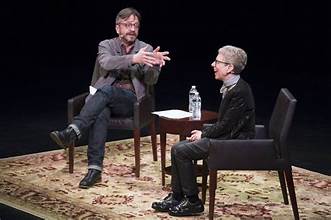In my last post, I covered the satisfaction deep conversation gives us. I broke it down and ended with a few wonderful quotes on the subject, but I had some residual attention on the famous people who have excelled as conversationalists. In this article, I want to shine a light on the best ever and some who are worthy of mention and are actually alive now. Let’s begin with the all-time greats and finish with those who we can relate to presently in a world which is a far cry from yesteryear.

Ancients
Socrates: This iconic Greek philosopher, born in 469 B.C., is probably unmatched in his crafting of conversation. Having gained a grand reputation as a philosopher and a wise man, he was reluctant to give his opinion on practically anything. He would rise early and go to places where people gathered, engaging any person who seemed likely to provide him with stimulating or amusing discussion. He was known to call for the definition of a large concept, then to reveal its incompleteness, its contradictory content or its absurdity. He led on the participants with questions they would respond to with a fuller and more complete definition, which he himself never completed with his own answer. His mastery of conversation enabled him to direct the flow of the exchange of ideas with groups. He answered his critics who complained about his unwillingness to come right out with his own ideas, saying “the god compels me to be a midwife, but forbids me to bring forth.” He didn’t profess to teach anything more than the art of examining ideas.
Teng Shih: Sometimes called the Socrates of China, this lawyer and philosopher lived in the fifth century, BC. He was a famous intellectual rebel who taught right and wrong were relative and not absolute. He could argue endlessly in favor and against various moral positions. Teng eventually composed a code of penology that the government found to be too idealistic. He posted them where the common folk could easily see them. The prime minister prohibited the posting of pamphlets in public places. Teng then delivered them to people in person. The minister forbade the delivery and Teng smuggled them to his readers, concealed in other articles. The government answered this disobedience by beheading him.
Renaissance
Martin Luther: The architect of the Christian Reformation was a gregarious man. He wrote a lot in his famous pamphlets, but he was known to immerse himself in discussion regularly. He and his wife Katerina were generous and hospitable. They were known to have a wide variety of people at their home for dinner. Luther would initiate stimulating and meaningful discussion by asking those around the table about their views on current issues or debates. Sometimes, he would start with his own commentary on the news of the day. They often had students staying with them and it was their inclination to take notes on Luther’s quotable statements. There were at least eight editions of these, compiled in a series titled Table Talk. As students came and went over the years, they had volumes of his sayings recorded for posterity.
Early Modern Period

Catherine de Vivonne, marquise de Rambouillet: This society hostess and French social leader forged a place in history as a huge influence on the development of French literature. As Britannica puts it, “Revolted by the coarseness of the French court under Henry IV and distressed by the amount of political intrigue, she set out to establish at her townhouse, the Hôtel de Rambouillet, a salon devoted to literature and cultured conversation where nobles and men of letters could mingle on an equal footing.”
Catherine’s establishment of this forum and her own communication with a rich sense of humor made the salon a vital part of cultured society for hundreds of years.
Contemporary
Bill Moyers: I have found it difficult to come up with truly great conversationalists in our era. There are some amazing speakers, such as politicians like Winston Churchill and brilliant comics like George Carlin. There have been a number of astute interviewers, William F. Buckley Jr., Dick Cavett and Barbara Walters to name just a few. Of those stellar personalities, one stands out as more than just an interviewer. Bill Moyers’ career as a journalist led to decades as a TV interviewer. He has said he thinks of television as a campfire, where he gathers sensitive people to talk, to listen and to enjoy a shared experience. With his probing questions and expansive responses, he would jointly develop a topic with his many guests in a way that brought greater understanding about matters of tremendous substance and depth.
Terry Gross: I came to choose Ms. Gross in a roundabout way. I’ve thought of her as an incredible interviewer, so she didn’t identify in my mind as a pure conversationalist. As I wrote above, real conversation was no longer part of public culture. Then it hit me. Podcasts engender a bounty of excellent conversation, and they have become so popular, there are a remarkable number of people taking part in stimulating, complex, nuanced and intelligent discussions across our country.
I admit I haven’t listened to enough podcasts to know for myself who the best hosts are, so I did a search to find out. The Top 15 Famous Podcasts list gave me the most popular ones, such as Joe Rogan, Ashley Flowers, Ben Shapiro, and Keith Morrison. My podcast junkie daughter suggested Jordan Harbinger as one who qualifies as an outstanding conversationalist. He seems like a real natural. However, when I learned Fresh Air, the radio show Terry Gross hosts, is now a podcast, I couldn’t help but nominate her. For a long time, I’ve admired her show and her easy manner of carrying on a conversation with her guests. Yeah, it’s an interview, but I’m convinced she goes off-script when the discussion invites her to probe deeper as a guest surprises her with an answer to a question. She adds her take when appropriate, and that adds value to the conversation. She draws information into the open with ease and skill I’ve rarely seen.
So, yes, I’m giving Terry Gross a spot on this list of all-time great conversationalists. I believe she deserves it. Yet, there could have been so many others from this culture of podcasters. I’ve heard quite a bit of stellar conversation from hosts I’ve overheard in our daughter’s listening around the house when she’s not wearing the headphones. Ms. Gross is somewhat famous, has a proven track record in public conversing and she has a voice I could listen to all day.
Talkative Times
I see this as a golden age for conversationalists. The podcast has risen to the heights of entertainment. Although I’m not a fan of some of the content and what I see as weak use of language with the over-use of profanity and an unnecessary presence of professional “laughers,” I recognize the brilliant interaction between people developing thought into perceptive conversation.
